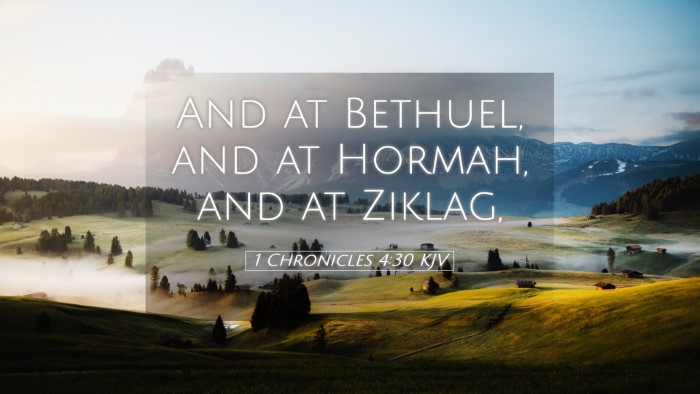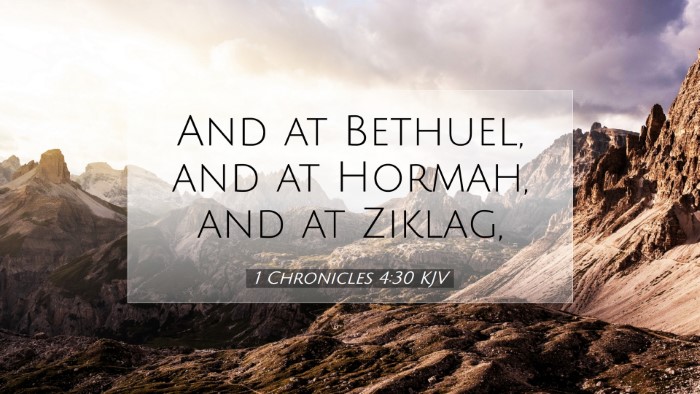Commentary on 1 Chronicles 4:30
1 Chronicles 4:30 states: "And in Beersheba, and Moladah, and Hazarshual,". This verse provides a glimpse into the geographical and genealogical context of the tribe of Judah. The Chronicler, in his narrative, emphasizes the importance of heritage and the land inhabited by the descendants of Judah. Below, we explore insights from several renowned public domain commentators.
Contextual Background
This verse appears in a section detailing the descendants of Judah, presenting names of towns significant to the tribe. David's line is rooted in the history of Judah, contributing to the overall purpose of Chronicles, which is to reaffirm the legitimacy and divine choice of this tribe and its heritage.
Matthew Henry's Commentary
Matthew Henry reflects on this passage, emphasizing the following key points:
- Geographical Significance: Henry observes the mention of locations such as Beersheba, which bears rich historical significance as the southern border of Judah. The setting marked the ongoing presence of God's covenant with Abraham, Isaac, and Jacob.
- Family and Heritage: He highlights that this genealogy underscores the importance of family lineage in God's plan. The names of these cities serve as markers of the territory God assigned to His people.
- Divine Providence: Henry asserts that the careful recording of these places shows God's providence in maintaining Israel's identity and heritage through trials and tribulations.
Albert Barnes' Commentary
Albert Barnes adds depth to our understanding of the verse through the following insights:
- Historical Context: Barnes contextualizes the locations named in this verse, pointing out that they were part of a region known for its historical battles and covenantal significance. It reminds readers of Israel's journey and struggles.
- Role of Judah: He notes the prominent role of Judah in the lineage of Jesus Christ, connecting the tribal geography to the broader narrative of salvation history.
- Spiritual Lessons: Barnes draws parallels to contemporary readers about the importance of understanding one's heritage in faith, encouraging believers to recognize their roots in God's providential plan.
Adam Clarke's Commentary
Adam Clarke provides a more detailed examination of the locales mentioned, enriching the interpretation with the following insights:
- The Cities Identified: Clarke focuses specifically on the significance of each city listed. He suggests that Beersheba is not only a physical location but represents a spiritual milestone in Israel's history and relationship with God.
- Symbolism of Names: The names of cities are examined in light of their meanings and attributes. Each designation carries with it a theological significance that offers insights into God's character and dealings with His people.
- Collective Memory: Clarke emphasizes the importance of remembering the past, asserting that these genealogical records remind the current generation of God’s faithfulness and the legacy they inherit.
Application for Today’s Readers
The genealogical listings, while detailed, carry profound meaning and application for believers today. Here are several points of reflection:
- Understanding Identity: Just as the tribes of Israel found their identity in their heritage, modern believers are called to ground themselves in their identity in Christ, looking back at the Scripture to understand who they are as God’s people.
- God’s Faithfulness: Chronicles provides reassurance of God’s unwavering faithfulness throughout generations, encouraging readers to trust in His promises amid uncertain circumstances.
- Community and Legacy: The importance of community is highlighted in genealogies. Today's believers are encouraged to seek relationships within their faith communities, valuing the legacy they inherit and the one they will pass on.
Conclusion
1 Chronicles 4:30 serves as a crucial reminder of the interwoven nature of God’s narrative throughout history. Through the insights of Henry, Barnes, and Clarke, we see that each name and location are deliberate choices in the unfolding narrative of redemption. This passage not only roots individuals in their spiritual lineage but also invites them into a deeper relationship with the Savior whose lineage they share.


